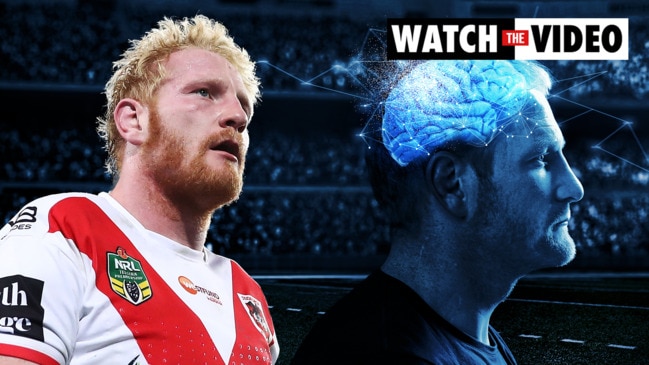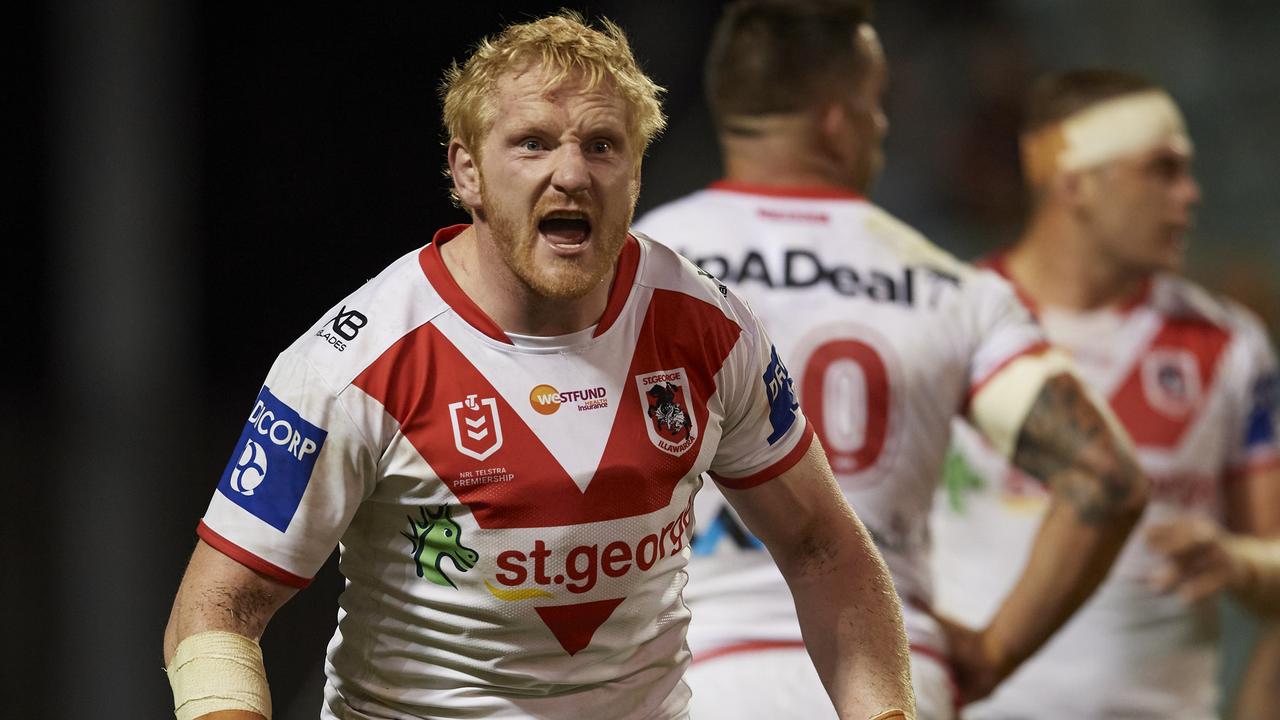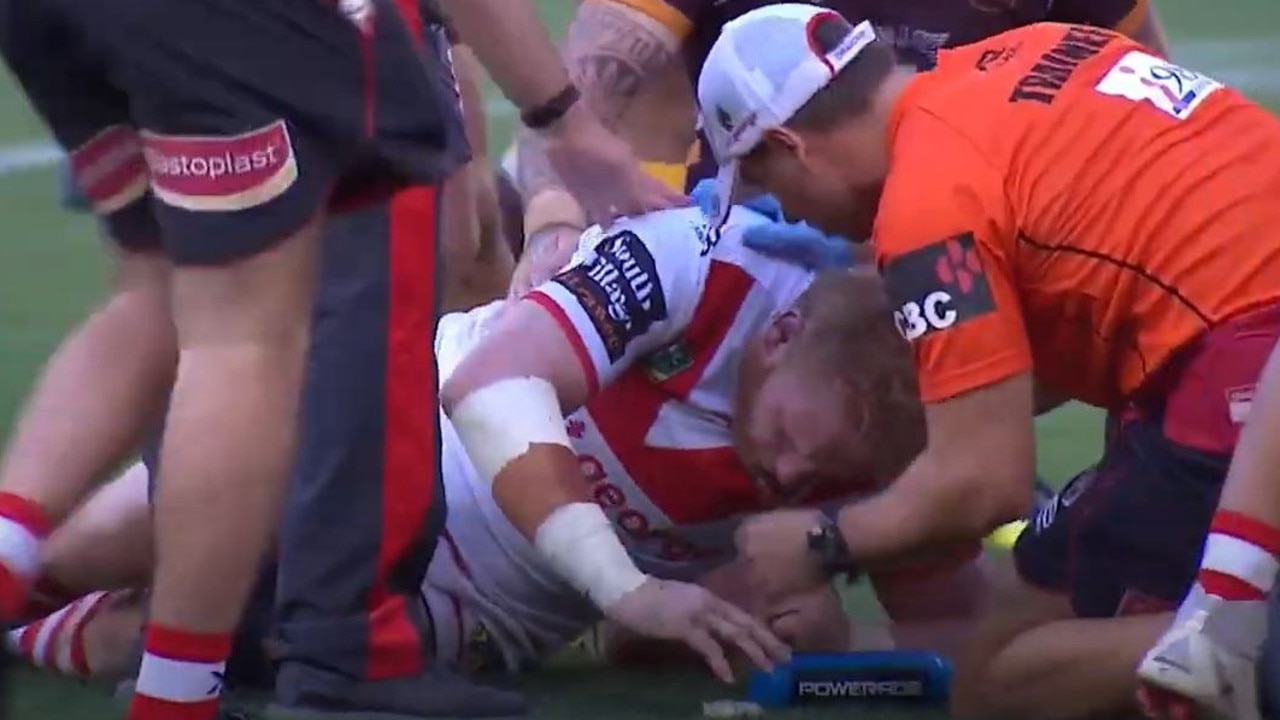‘Utterly chilling’: James Graham reveals NRL ‘shrunk my brain’
NRL cult hero James Graham has revealed staggering details of a recent diagnosis that has sent shockwaves around the NRL.

James Graham has revealed he has been told by doctors that his brain is losing volume.
The former Bulldogs and Dragons star has been one of the headline cases in the concussion scandal that has rocked Australian sport in recent years, having admitted he suffered 100 concussions during his career.
His backflip on controversial views about the issue have come to symbolise the shift in professional sport about the need to protect athletes from themselves against cases of head trauma and chronic traumatic encephalopathy (CTE).
The 36-year-old last month launched the Head Noise podcast in association with The Australian, investigating concussion and head injuries and revealed he had taken more than 18,000 hits in his career, which spanned 423 games between the UK Super League and NRL as well as a further 53 games in international football.
In the latest edition of the Podcast, Graham reveals he was recently told there is evidence he has suffered brain trauma that is “significant”.
“And in my neurologist’s rooms, that was proven to be true,” Graham said, according to The Australian.
“While the neuropsychological tests I passed quite well … it has been confirmed via an MRI scan that part of my 36-year-old brain is damaged, that is ‘down on volume’ at the front and side part of my brain.

“As my neurologist, Dr Rowena Mobbs, explained, my frontal lobe (the front) and the parietal (the side part behind the frontal lobe) were all down on volume for a man my age. ‘Mildly so,’ Dr Mobbs tells me, but enough to say it’s ‘significant’.”
He wrote in a column for News Corp newspapers on Saturday that: “For someone my age, my brain should not be losing volume like this”.
He joked he will be able to use a “small brain” as an excuse for any mistakes he makes in the future.
His revelations made neuroscientist Lila Landowski cringe when discussing Graham’s situation on ABC’s The Drum on Friday night.
Having listened to Graham reveal details of his condition on the podcast, host Dan Bourchier said: “That was utterly chilling to watch and hear”.
Graham responded on the program by further outlining his ongoing campaign to lobby for greater action across elite and amateur sport to address CTE.
The condition is believed to be caused repeated blows to the head and is only able to be diagnosed after death. Symptoms include short-term memory loss, changes in mood including depression, and outbursts in anger, and confusion and disorientation.
NRL great Mario Fenech recently revealed the terrifying toll the condition has had on his quality of life and it has been reported he will soon need full time care.

Graham does not have the condition — at least for now.
He said on the ABC he isn’t looking for sympathy in his recent campaign, but is simply hoping to create traction by putting the issue into mainstream discussions.
Graham is a board member of the Australian arm of the Concussion Legacy Foundation.
In 2019, Graham said he was willing to accept the risk of head injuries in order to continue to play the game he loves.
“It’s my life, I’ll do what I want to … well, within certain realms,” Graham said at the time. “What’s the alternative? I kind of like what I’m doing. The consequences of that are sometimes you get hit on the head.
“You’ve got to go and play Oztag if you don’t fancy playing league anymore. But I wouldn’t get paid and I probably wouldn’t have as much fun.
“It’s my life … I have children, I know the importance of them having a father but I’m protecting myself as best as I can and doing all the research myself.
“I’ve done my research, I’ve had my tests done, I know what’s going on in my head and in my body. I’m seeing the appropriate people if there’s something to do about that but I’ll get on with it myself and stick to the laws of the game.”
Graham doubled down in 2021 after his retirement, adding he had to weigh up giving the game away for his brain health against the consequences of not playing the game he called “the be-all and potential end-all of my life”.
“Where was the purpose going to be filled in my life? I personally felt like I needed a cause,” Graham said on NRL 360. “I thought about what’s the meaning of life? Maybe for me, finding the meaning of life was finding something worth dying for.”
Recent cases of head trauma in Australian sport include the high profile cases of Roosters captain Boyd Cordner retiring at age 29 as a result of his concussion issues.
CTE has been found after the deaths of AFL greats Danny Frawley and Shane Tuck.
The Concussion Legacy Foundation was founded to support athletes, veterans and any one else affected by head injuries and was founded by former gridiron player and WWE wrestler Christopher Nowinski.



